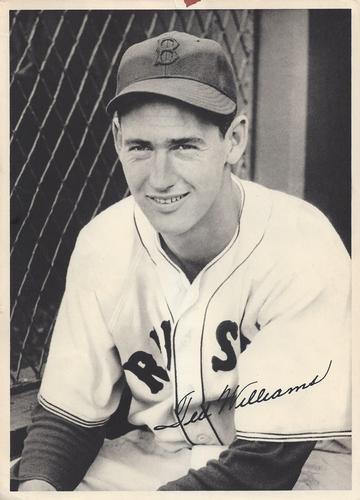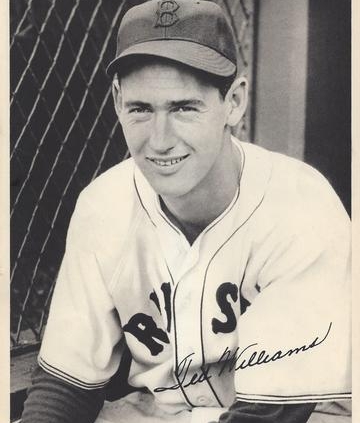August 29, 1939: Red Sox rookie Ted Williams hits another grand slam, second game-winner in a row
 Ted Williams must have enjoyed his July and August 1939 visits to Cleveland. In a period of 45 days, he hit three game-winning home runs in Cleveland ballparks. On July 15, at Cleveland Stadium, he hit a solo home run off Johnny Broaca in the top of the eighth inning, breaking a 5-5 tie and giving the Red Sox the edge they needed to win the game, 9-5.
Ted Williams must have enjoyed his July and August 1939 visits to Cleveland. In a period of 45 days, he hit three game-winning home runs in Cleveland ballparks. On July 15, at Cleveland Stadium, he hit a solo home run off Johnny Broaca in the top of the eighth inning, breaking a 5-5 tie and giving the Red Sox the edge they needed to win the game, 9-5.
The team’s next visit to Cleveland came at the end of August. The Indians won both halves of a Sunday doubleheader on August 27, 1-0 and 5-3. The Sunday twin bill was also played at Cleveland Stadium, drawing 23,450.
The next two games shifted back to League Park, the smaller venue where the Indians played most of their games. On August 28, before just 2,000 fans, the Indians held a 5-2 lead through seven innings. But center fielder Doc Cramer doubled, left fielder Joe Vosmik walked, and Boston first baseman Jimmie Foxx singled to center, scoring Cramer.
Mel Harder remained on the mound as Ted Williams came to bat, with runners on first and third. Williams swung at a curveball by a foot and missed, bringing the count to 3-and-2. Then he powered out a three-run homer over the right-field screen to make it Boston 6, Cleveland 5. Those three runs won the game for Boston.
Even fewer spectators turned out for the Tuesday afternoon game on August 29 — some 1,500. The starting pitchers were Lefty Lefebvre for the Red Sox, in just his third career appearance and his second of 1939, and Harry Eisenstat for the Indians. He was also a left-hander, 23 years of age but already in his fifth season. He’d come to Cleveland from the Detroit Tigers in mid-June. He had a career record of 19-17 and was 6-5 with a 3.91 ERA in 1939. He’d shut out the Athletics four days earlier.1
The first inning and a half of the game was fairly uneventful, but in the bottom of the second the first two Cleveland batters singled off Lefebvre and then he walked the third batter. The bases were loaded with nobody out. But he bore down and struck out the next two batters, the second one being Eisenstat, and then got 22-year-old shortstop Lou Boudreau — who had been recalled from the minor leagues earlier in August — to ground out.
Lefebvre himself singled with two outs in the top of the third, and Doc Cramer followed with another single, but Vosmik flied out to right field.
The game was still scoreless through the first four innings.
Shortstop (and Red Sox manager) Joe Cronin doubled to lead off the fifth inning. Third baseman Jim Tabor flied out deep to right field, and Cronin tagged and took third. Catcher Gene Desautels singled to Boudreau at short; Cronin prudently remained at third. Lefebvre got on base again, this time with a walk to load the bases.
Cramer grounded out to third baseman Ken Keltner for the second out of the inning, the throw going to first base as Cronin scored. Vosmik walked, again loading the bases.
Jimmie Foxx grounded to Boudreau, who misplayed the ball and was assessed an error. Desautels scored an unearned run for a 2-0 Red Sox lead. The bases remained loaded.
That brought up Ted Williams. On a 2-and-1 count, the “smiling stringbean rookie sensation” hit a grand slam that “traveled at least 400 feet over the right-center field wall.”2 Sportswriter Eugene J. Whitney of Cleveland’s Plain Dealer explained that the ball “ricocheted off electric light wires on the south side of Lexington Avenue and bounced into a parking lot.”3
Suddenly, it was 6-0, Red Sox. After second baseman Bobby Doerr walked, manager Ossie Vitt brought in a reliever, Floyd Stromme.4 He gave up a single to Cronin, but got Tabor to fly out to left for the third out.
The Indians got one off Lefebvre in the bottom of the fifth on a one-out walk, a two-out single, and then another single by left fielder Jeff Heath. It was 6-1.
Stromme got Desautels to ground out in the top of the sixth. Lefebvre singled, getting on base for the third time in a row. Cramer singled. Vosmik popped up foul to the catcher. Foxx walked. The bases were loaded once more for Ted Williams.
This time he drew a walk, as Stromme pitched carefully. Lefebrve scored on Williams’ fifth RBI of the game. Arthur Sampson of the Boston Herald suggested that Stromme had seen Williams hit a three-run homer and a grand slam in back-to-back days and “apparently figured it was better to give up one run than four.”5 Doerr took a called third strike to end the inning.
Lefebvre retired the side in order in the sixth. He gave up a pair of singles in the seventh, but the score remained 7-1.
He may have run out of steam. The first three Indians singled in the bottom of the eighth, the third of the three by catcher Rollie Hemsley, driving in Keltner. Joe Heving relieved Lefebvre.
A wild pitch resulted in runners at second and third. A sacrifice fly by pinch-hitter Odell “Bad News” Hale scored a second run. After Boudreau flied out to center, right fielder Bruce Campbell tripled to center field with Hemsley scoring. The score stood 7-4. But right fielder Ben Chapman flied out and the inning was over.
Johnny Broaca relieved Stromme in the top of the ninth. Williams drew a leadoff walk. Doerr sacrificed him to second base. Then Cronin and Tabor both walked. But Lou Finney, pinch-hitting for Desautels, struck out, and Heving popped up to shortstop.
Heving retired the Indians in order in the bottom of the ninth.
Lefebvre got the win, his first major-league decision.6
Cronin praised Williams in the next day’s Boston Globe. “The Kid has lived up to his advance notice,” the Red Sox player-manager said. “I guess that’s so even if he doesn’t drive in another run for the rest of the year.”7
At it happens, the Red Sox rookie right fielder drove in quite a few more runs in 1939 — 30 more. On this day in Cleveland, Ted Williams added five more RBIs to the three he had had the day before, for a total of 115. By season’s end, he had 145 RBIs, the first time a rookie had led the majors in runs batted in — and a still-standing rookie record, as of 2020.
This all happened the day before Williams’s 21st birthday — but no one in baseball knew it. He had declared his birthday to be October 30, so that it would not come up during the baseball season and become a distraction. He confessed this to sportswriter Harold Kaese of the Boston Globe: “I didn’t want to celebrate my birthday during the playing season.”8 Baseball cards were among those sources that perpetuated the October 30 date; it was not until 1956 that a card — from Topps — reflected the August 30 date, the one that is on his military records.9
Sources
In addition to the sources cited in the Notes, the author consulted Baseball-Reference.com and Retrosheet.org.
https://www.baseball-reference.com/boxes/CLE/CLE193908290.shtml
https://www.retrosheet.org/boxesetc/1939/B08290CLE1939.htm
Notes
1 Eisenstat’s first three seasons were spent in the National League with Brooklyn.
2 Gerry Moore, “Ted Williams Poles Homer to Win for Red Sox, 7 to4,” Boston Globe, August 30, 1939: 21.
3 Eugene J. Whitney, “Williams Lashes Homer with Bases Full to Beat Tribe Again,” Cleveland Plain Dealer, August 30, 1939: 16.
4 Stromme, a right-hander, was from Cooperstown — Cooperstown, North Dakota. He’d joined the Indians in July and had worked in only three previous games. This was his fourth of the five major-league appearances he had in this career. In this game, he worked 3⅓ innings, giving up three hits and one run. He did walk three. He was 0-1 for his major-league career, a game he’d lost in St. Louis in July.
5 Arthur Sampson, “Williams Slam Homer Gives Sox 7-4 Win,” Boston Herald, August 30, 1939: 29.
6 As a point of interest, on June 10, 1938, Lefebvre had hit a Fenway Park home run in his first at-bat in the major leagues.
7 Gerry Moore, “‘Timely Ted,’ Williams’ New Nickname with Sox,” Boston Globe, August 30, 1939: 20.
8 Kaese offered, “He thought of everything, even when he was a kid.” See Harold Kaese, “Ted Pulls Punches as Memoirs Start,” Boston Globe, April 17, 1954: 13.
9 Indeed, he may actually have been born on August 20. The story is explored in detail in Bill Nowlin, Ted Williams: First Latino in the Baseball Hall of Fame (Cambridge, Massachusetts: Rounder Books, 2018), 19, 79-82.
Additional Stats
Boston Red Sox 7
Cleveland Indians 4
League Park
Cleveland, OH
Box Score + PBP:
Corrections? Additions?
If you can help us improve this game story, contact us.


